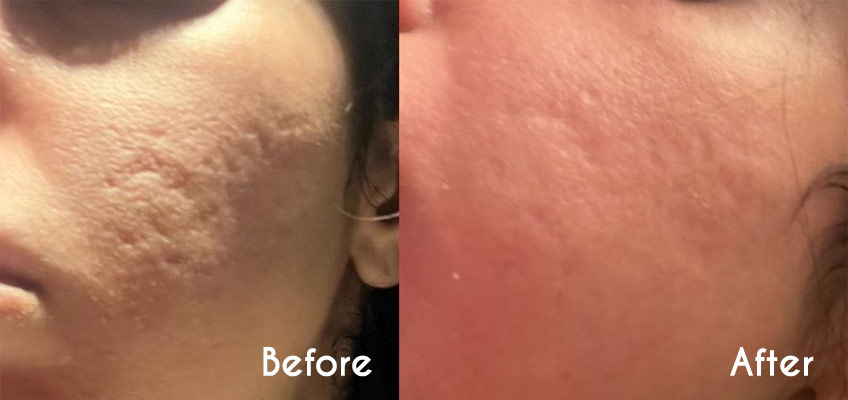
What are acne scars?
Acne scars are a type of skin injury that develops after inflammatory acne lesions have healed. The body creates collagen to heal the damaged tissue when acne-related skin inflammation occurs. Scarring, however, can happen if the body creates too little or too much collagen during the healing process.
Acne scars can appear in a variety of ways, including:
- Hypertrophic scars: During the healing process, collagen is overproduced, resulting in these scars, which resemble elevated lumps on the skin.
- Atrophic scars: The most typical type, which appear as depressions or indentations in the skin. Depending on their size and shape, atrophic scars can also be divided into ice pick scars, boxcar scars, and rolling scars.
- Post-inflammatory hyperpigmentation (PIH): Although technically not a scar, PIH is a typical side effect of acne. In areas of the skin where acne lesions have healed, PIH manifests as dark blotches.
There are several treatment options, including chemical peels, microdermabrasion, laser therapy, and dermal fillers. The type and intensity of the scars determine the best course of action.
How do you develop acne scars?
After an acne breakout, the body’s natural healing process results in acne scars. The body produces collagen to repair the damaged tissue when acne causes inflammation on the skin. However, scarring can occur if the body produces insufficient or excessive collagen during the healing process.
Acne scarring can be caused by a number of factors, including:
- Changes in hormones: Acne can be exacerbated and the likelihood of scarring raised in some cases by hormonal swings.
- Genetics: Genetic factors may make some people more likely to get scars
- Inadequate or delayed treatment: Acne can increase the likelihood of scarring if it is not treated promptly or effectively.
- Chronic or severe acne: Scarring is more likely to occur when an acne breakout is more severe and lasts longer.
- Squeezing or picking pimples: Acne lesions can become even more inflamed and damaged if they are picked or squeezed, which can make scarring more likely.
How can we treat acne scars?
There are many different ways to treat acne scars, depending on the kind and severity of the scarring. Acne scar treatment options include the following:
- Chemical peels: To get rid of the outer layer of dead skin cells and encourage collagen production, a chemical solution is applied to the skin. This can help acne scars look better.
- Skincare: Acne scars can be reduced over time by using creams and gels that contain retinoids, vitamin C, and other ingredients.
- Laser treatments: Acne scars can be diminished, rough skin can be smoothed out, and collagen production can be stimulated through a variety of laser treatments.
- CO2 laser treatments: CO2 laser treatment is a type of laser resurfacing that can help to reduce the appearance of acne scars.
- Microneedling: This process stimulates the body’s natural healing response by stimulating collagen and elastin, which can help to reduce the appearance of acne scars.
- Pico Genesis FX: This laser treatment uses very short pulses of energy to break down pigmentation and make more collagen. This can help scars look better and allows for rejuvenation of the skin.
To book your complimentary consultation appointment, call us at 416-548-6548 Book a Consultation
